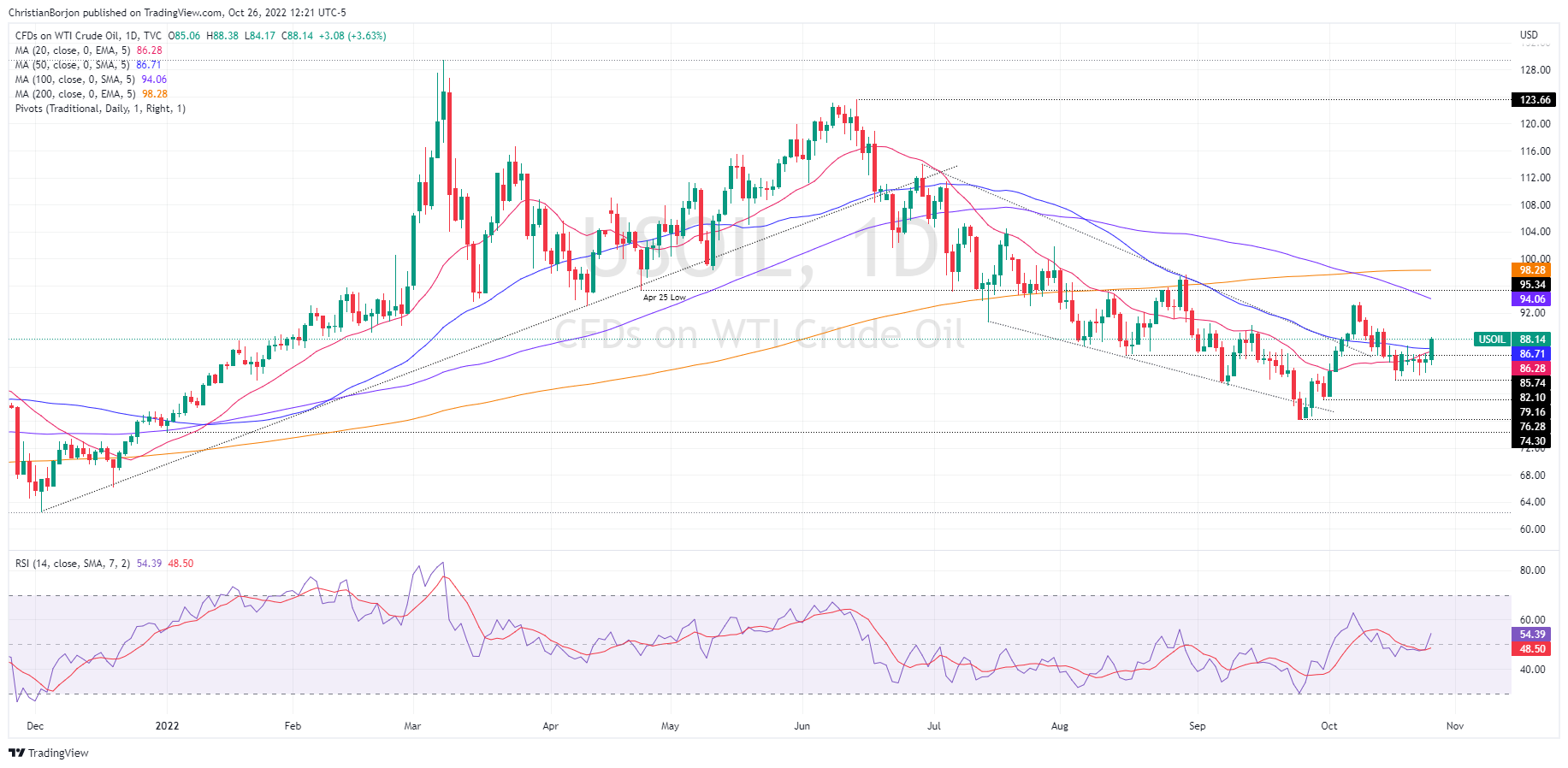- Analytics
- News and Tools
- Market News
- WTI reaches two-week highs at around $88.00 on soft US Dollar
WTI reaches two-week highs at around $88.00 on soft US Dollar
- Western Texas Intermediate (WTI), the US crude oil benchmark, has risen close to 4%.
- US inventories added 2.6 million barrels, above estimates but lower than Tuesday’s API’s 4.5 million build-ups.
- WTI Price Analysis: A move toward $90.00 is almost certain after regaining the 20/50-DMAs.
WTI soared during the New York session, propelled by the overall US Dollar weakening, tumbling more than 1%, while WTI’s exports hit an all-time high due to domestic refiners operating at a higher level. At the time of writing, WTI is trading at $88.05 per barrel after hitting a daily high of $88.38.
The US Dollar Index, a gauge of the buck’s value against a basket of peers, is stumbling for the second consecutive day, more than 1%, down from 111.135 highs to 109.774, a tailwind for the oil price.
Also, given the backdrop of the Organization of Petroleum Exporters Countries (OPEC) decision to cut oil output bolstered WTI price as the market prepares for tighter supply in the coming months. Additionally, the shortage of Russian products due to an oil embargo will have implications for inflation, according to Goldman Sachs, in a note quoted by Bloomberg.
In the meantime, US crude stockpiles rose by 2.6 million barrels, exceeding estimates but lower than data reported by the American Petroleum Institute (API), which showed a sharp increase of 4.5 million in US inventories. Furthermore, exports rose to 5.1 million BPD, the highest ever, while US imports dropped.
WTI Price Analysis: Technical outlook
WTI is neutral biased, though once it reclaimed the 20 and 50-day Exponential Moving Averages (EMAs) in the same trading session, a test of the $90.00 per barrel is on the cards. Notable, the Relative Strength Index (RSI) jumped in the last two days after oscillating around the 50-midline. So, as the RSI gathers bullish momentum, if oil buyers reclaim the $90.00 figure, a move towards the 100-day EMA at $94.05 would likely happen.

© 2000-2026. All rights reserved.
This site is managed by Teletrade D.J. LLC 2351 LLC 2022 (Euro House, Richmond Hill Road, Kingstown, VC0100, St. Vincent and the Grenadines).
The information on this website is for informational purposes only and does not constitute any investment advice.
The company does not serve or provide services to customers who are residents of the US, Canada, Iran, The Democratic People's Republic of Korea, Yemen and FATF blacklisted countries.
Making transactions on financial markets with marginal financial instruments opens up wide possibilities and allows investors who are willing to take risks to earn high profits, carrying a potentially high risk of losses at the same time. Therefore you should responsibly approach the issue of choosing the appropriate investment strategy, taking the available resources into account, before starting trading.
Use of the information: full or partial use of materials from this website must always be referenced to TeleTrade as the source of information. Use of the materials on the Internet must be accompanied by a hyperlink to teletrade.org. Automatic import of materials and information from this website is prohibited.
Please contact our PR department if you have any questions or need assistance at pr@teletrade.global.















